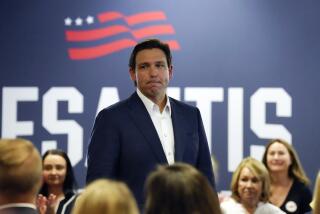The Case for Music Education : Schools: Group seeks to prevent the elimination of programs in San Diego.
- Share via
SAN DIEGO — The plight of music in the schools is not unlike the old saw about the weather--everyone talks about it, but no one does anything about it.
Last January, however, a group of educators, parents and members of the local music community organized to lobby the San Diego Unified School District to increase its support of music education within the district.
In its latest monthly meeting, held Monday night at San Diego State University, the Community Council for Music in the Schools honed its strategies and heard from a panel of five middle-school music educators and Russ Vowinkel, principal of De Portola Middle School.
“We feel it’s now or never for music in our schools,” said council co-chair Mary MacKenzie at the meeting’s outset.
But, as the meeting progressed, a slightly less apocalyptic and more complex picture took shape.
In sheer statistical terms, the Community Council’s main complaint is that half of the district’s 70 elementary schools have no music instruction from certified music teachers. And even two San Diego high schools--Hoover and Riley--offer no music courses, and others such as University City High and La Jolla High have but a single music course available.
“We have now reached the point where we have principals and parents who have had no basic music experiences in their own education,” said Community Council co-chairwoman Ann Marie Haney. “We don’t miss what we haven’t had.”
Several middle school music instructors described thriving band programs at Bell and Wangenheim junior highs and De Portala, but Haney pointed out that Muirlands Junior High offers no music instruction, and the marginal program at Standley Junior High is about to be shut down. Anthony Ales, a band director at two middle schools, agrees that band programs are flourishing, but he worries that the few extant orchestras are dying out or being closed down in the district.
Pacific Beach resident Nancy Brusch complained that the district lacks a consistent music policy, so that the whim of a principal or some other factor determines whether or not a school offers music classes and activities.
“As a parent, it terrifies me to know that it depends on which school my kid goes to whether or not a (pro-music) principal will be there,” Brusch said. “This district does not have a philosophy of music.”
Because their son would have had to give up playing clarinet in Ales’ Pacific Beach Middle School band, Brusch and her husband decided against enrolling their sixth-grade son Richard to Muirlands so he could participate in a specialized academic program.
“With the positive effect music has had on our son, we don’t feel we should have to pit music participation against his other subjects. We believe that music and the arts are an integral part of learning.”
Kay Wagner, the San Diego district’s visual and performing arts program manager confirmed that there was no district policy that mandated music instruction. She also corroborated the assertion that school principals have a great deal of latitude in deciding whether or not their school will offer music classes.
“I do not see the district agreeing on uniform standards for all schools, since the trend is toward giving more autonomy to each school,” Wagner said.
Martin Chambers, chairman of the San Diego State University music department and treasurer of the Community Council also criticized the board’s lack of a clear music policy.
“The district lacks a philosophy that music must be at all costs part of the core curriculum. To a certain extent, music is discretionary with each principal--if a principal decides to allocate resources elsewhere, the program crumbles. I understand budget constraints--as a California State University adminstrator, I understand that. I’m not advocating that we put music over every other program, but what I find lacking is an underlying philosophy that says were going to commit to music specialists in every school over the long term.”
School board member Ann Armstrong, who did not attend the council’s SDSU meeting but gave her views in a phone interview, acknowledged music’s plight and aligned herself with the aims of the Community Council.
“The last 10 years have been a difficult period for music and the arts,” Armstrong said. “Music and arts have been perceived by some as peripheral to (education’s) central task, so they are the things that have been crunched. Many people would argue that music is part of basic education, and although I’m speaking as just one board member, I think it is.”
Besides urging the school board to work music into its overall philosophy, the Community Council has some highly specific requests for next year.
“We need seven more elementary instrumental teachers to provide music for the 35 schools in the district that have no music instruction at all,” Haney explained. “We also need three resource teachers, non-classroom teachers who will work out of the central office to assist music and art teachers with curriculum planning and give them in-service training.”
Haney also enumerated the needs for new band and orchestra instruments, as well as funding for a pilot program that uses electronic keyboards to teach music to elementary school students.
Board member Shirley Weber, who gave the Community Council high marks for its broad base of support and its credibility, said in a phone interview that she finds merit in the Community Council’s requests.
“We are all in favor,” said Weber, “but at this stage we don’t know what the (district) budget will look like.”
Weber avoided commiting herself to advocating more money for music in next year’s district budget because of uncertainties of state funding in this election year.
“We won’t know what the budget will look like for several months, because the governor is not going to give his usual May revision due to the propositions on the June ballot.”
Chambers summarized his organization’s credo, the reason its members were willing to address board meetings and sit through lengthy committee hearings.
“Our whole culture becomes much paler without music. It’s a sign of being highly civilized,” said Chambers, who spent the early years of his career as a singer in European opera houses. “I feel that our students are not getting what they need to become rounded adults.”
More to Read
Sign up for Essential California
The most important California stories and recommendations in your inbox every morning.
You may occasionally receive promotional content from the Los Angeles Times.













